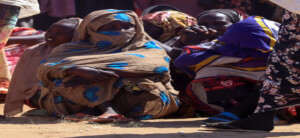Darfur rape victims ‘do not receive treatment, justice’: Waging Peace
In Darfur, rape largely occurs without being reported to the police, and with low conviction rates for offenders, according to recent research by a UK-based human rights organisation. Almost two-thirds of the interviewed victims report being raped upon leaving the zones and camps for displaced people that are under the control of African Union-United Nations peacekeepers.
The 77 first-hand accounts of rape victims in Darfur, acquired by Waging Peace, demonstrate that sexual violence in the conflict area is rampant. “It is politicised by members of all armed parties, and largely occurs in a vacuum of justice, with low reporting rates and even lower conviction rates for offenders,” Waging Peace reported today. The testimonies document incidents from 2004 to late 2014, though most cover incidents dating from 2012 onwards.
In Darfur, rapes largely occur without being reported to the police, and with low conviction rates for offenders, according to recent research by a UK-based human rights organisation. Almost two-thirds of the interviewed victims report being raped upon leaving the zones and camps for displaced people that are under the control of African Union-United Nations peacekeepers.
The 77 first-hand accounts of rape victims in Darfur, acquired by Waging Peace, demonstrate that sexual violence in the conflict area is rampant. “It is politicised by members of all armed parties, and largely occurs in a vacuum of justice, with low reporting rates and even lower conviction rates for offenders,” Waging Peace reported today. The testimonies document incidents from 2004 to late 2014, though most cover incidents dating from 2012 onwards.
Most of the victims told Waging Peace that they did not receive the physical or psychological medical support they required. Approximately half of the victims received no treatment at all, and 17 were treated only with medicines or medicinal plants from the local area.
'Successful efforts to end the requirement of a police form prior to receiving medical treatment.'
The testimonies in 'Rape in Darfur: A history of predation' suggest that efforts to end the requirement for rape victims to fill out a‘Form 8’ reporting document in order to access post-trauma medical assistance have been mostly successful. Only two victims mentioned that Form 8 was required prior to receiving treatment.
2 cases led to prosecution
Less than a quarter of the total cases documented (19) were reported officially, and of these, the majority (13) were not acted on by either the police or Unamid. Four cases were reported to Unamid specifically, and in all of these the victims stated that Unamid “did nothing”.
One of the victims: “The Unamid made a report of the case and left. They did not come back to us after that. As for the police, they told us clearly: 'Go find something else to do. We do not have anything for you. Your rape problems are bothering us, there are too many of them; why do you go to the wilderness; stay in your camps'.”
In one case it was a police officer who raped a thirteen year-old girl. When the case was reported to the police, no action was taken. There are only two cases out of the entire sample in which the perpetrators were prosecuted and jailed. Sources have informed Radio Dabanga that local police in Darfur often refuse to file reported rape cases.
The wary attitute towards the Sudanese legal framework that concerns rape-related offences is likely to persist, Waging Peace writes. Victims might refrain from reporting cases of sexual and gender-based violence because Article 149 of the Sudanese Criminal Code (1991) confused rape with adultery. The controversial law was changed only recently, in the beginning of this year.
'Commanders seemed to encourage rapes'
Reportedly 82% of all cases involved multiple rapists. Sometimes the rapes documented by Waging Peace were part of a mass attack on a whole village, as in the case of the mass rape of at least 221 women and girls in the North Darfur village of Tabit in late October and early November 2014. “These facts suggest attacks are not immediately opportunist, but seemingly permitted or even encouraged by military commanders.”
The victims, however, could often not confirm which particular party to the conflict (such as the Sudanese army and rebel groups) committed the rape. They would usually note “only that men were armed, masked by shawls and in military uniform, not noticing or caring about their political allegiance”.
The research showed that most of the victims went out of the camps for displaced people, to perform work on farms or in valleys, or to collect personal belongings immediately following a displacement. The organisation did not say whether it conducted the interviews only with victims living inside camps in Darfur.
“The similarity in the accounts provided in the testimonies suggests that such attack proximate to Unamid have become routine, demonstrating a clear need for an improvement in Unamid's provision of physical protection for displaced people,” Waging Peace writes. It calls on the peacekeeping mission to continue its work in Darfur and increase the number and scope of patrols, in a way to protect displaced women going out of the camps.
Read the full report 'Rape in Darfur: A history of predation' by Waging Peace here.











 and then
and then